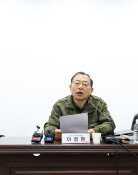[Editorial] National Pension Crisis Not Addressed Due to Upcoming Election
[Editorial] National Pension Crisis Not Addressed Due to Upcoming Election
Posted December. 24, 2003 22:52,
The parliamentary welfare affairs committee opened the subcommittee for deliberation on a bill to revise the National Pension Act. However, the committee adjourned without referring the bill to the plenary session because the lawmakers of the opposition Grand National Party objected to prompt passage of the bill, citing the driving back of subscribers and insufficient measures for growing numbers of cases of abuse in the pension system. However, if the current national pension system is left intact, we will face national financial disasters in the near future
If current pension systemwhich allows large pension benefits and small contributionscontinues, the national pension would enter the red in 2036 and its reserves would dry up by 2047. The gap between large benefits and low contributions will be 407 trillion won in 2050 and last of all hand a debt time bomb to our offspring. On top of that, the deliberative committee for the national pension is not professional enough to deal with pension funds, which are equivalent to the national yearly budget. Without collecting on the current unreasonable system, our generation also can be the victim of it.
In delaying the reform of this pension system further, we will face more serious obstacles. Currently, the number of pension recipients is 1.08 million and is expected to reach up to 3.23 million by 2008. The number will grow as time passes. This means the number of subscriberswhom we are to ask for an explanation and who are to resist the reformis also increasing.
A majority of nations know that concern over the upcoming election is the reason why politicians either object to or postpone the reform of the national pension. However, they should not increase the financial crisis because of their interests in the election. The GNP is not only to blame. President Roh Moo-hyun kicked off controversy during last years presidential campaign by saying, If we reduce the amount of benefits, the pension system will degenerate into a kind of pocket money system. Because of such remarks, people in Korea have suspicion that the reform of the pension system might amount to the deterioration of the national pension into a pocket money system.
If President Roh wants to dodge any move to criticize him for passing off the political responsibility on national pension reform to the opposition party, Roh should roll up his sleeves and convince opposition party lawmakers and other objectors. The opposition GNP also should hold committee and pass the bill to revise the act. They must stop watching the growing national pension crisis and forget their interests in the election.







